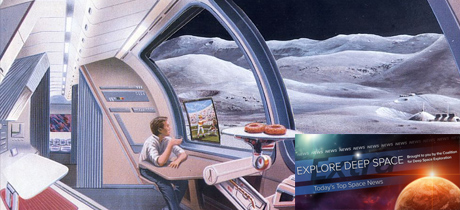In Today’s Deep Space Extra… NASA’s 2019 budget proposal emphasizes human space exploration with greater commercial participation. The White House spending plan sets the stage for cancellation of a major space telescope and Earth science activities that could fuel opposition. U.K. industry urges the British government to establish a national space program to foster growth.
Human Space Exploration
Trump administration refocuses NASA on human exploration, WFIRST is a casualty
Spacepolicyonline.com (2/13): The administration’s $19.9 billion budget proposal for 2019 includes $10.5 billion for human space related activities. However, a windfall of $300 million from last week’s budget deal with Congress falls away, and the agency can expect flat budgets of $19.6 million annually thereafter, a factor that will pace pledges of returning humans to the lunar environment and transition International Space Station activities to a commercial setting. NASA’s proposed human Deep Space Gateway (DSG) is renamed the Lunar Orbiting Platform-Gateway, whose first element would be launched in 2022. Still in the conceptual phase, the WFIRST space telescope would be cancelled along with NASA’s office of education. Expect bipartisan opposition, say some lawmakers. With comments from the Coalition for Deep Space Exploration.
Trump’s 2019 NASA budget request puts moon ahead of Space Station
Space.com (2/12): At $19.9 billion, the White House budget request for NASA in 2019 represents a $370 million increase over 2018. NASA has been directed to return to lunar orbit with astronauts launched on the Space Launch System and Orion crew capsule in 2023. A power and propulsion module as the first component of a human tended, lunar orbiting Deep Space Gateway (DSG) would be launched a year earlier. As NASA makes its way back to the lunar surface, low Earth activities like those conducted aboard the International Space Station are intended to transition to the private sector.
Nelson raps Trump’s NASA budget, plan to privatize Space Station
Orlando Sentinel (2/12): U.S. Senator Bill Nelson declared the Trump administration’s proposed $19.9 billion, 2019 NASA budget inadequate to reach Mars with human explorers and the proposed end to NASA’s funding of the International Space Station a “non-starter.” “Turning off the lights and walking away from our sole outpost in space at a time when we’re pushing the frontiers of exploration makes no sense,” said Nelson, a one-time shuttle passenger and ranking Democrat on the U.S. Senate Commerce Committee that shapes NASA policy.
Space Science
NASA budget proposal seeks to cancel WFIRST
Space News (2/12): NASA’s Wide Field Infrared Survey Telescope (WFIRST), slated for a mid-2020’s launching as a companion to the James Webb Space Telescope (JWST), would be terminated as part of the White House’s 2019 budget request for NASA. Conceptual activities began two years ago on a space observatory that could study dark energy, track the evolution of the universe and look for small planets beyond the solar system. NASA has been attempting to limit the complex project, a high priority of the National Academy of Sciences, to $3.2 billion.
Other News
Industry bosses urge Britain to get back in the space race
Daily Telegraph of London (2/11): British industry urges its government to establish a national space program, one that could help to ensure investments after the U.K. departs the European Union and its current funding posture.
Los Angeles Times (2/12): The debut of SpaceX’s Falcon Heavy rocket from NASA’s Kennedy Space Center on February 6 included the recovery of two of the three nine engine core stage boosters. The duo independently settled to the ground near the launch site. The center booster, however, was short on the fuel required to land on an off shore drone ship and crashed, SpaceX founder Elon Musk explained over social media.

